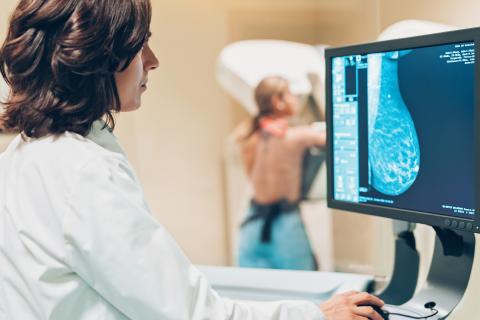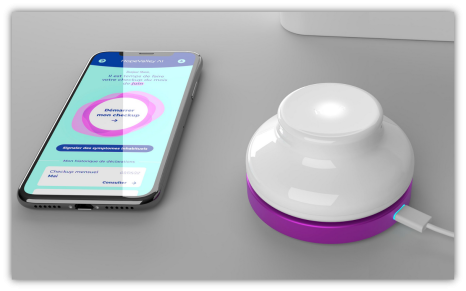
Hope Valley AI: a new, more effective and ethical form of non-ionising breast imaging for the prediction and early detection of breast cancer
During Pink October, breast cancer screening month, Hakima Berdouz, founder of the Hope Valley AI start-up, presents her start-up based on research carried out at the Institute of Applied Sciences and Simulation for Low-Carbon Energies (ISAS - Univ. Paris-Saclay, CNRS, CEA). Hope Valley AI has developed an artificial intelligence (AI)-assisted screening solution capable of predicting and detecting breast cancer at an early stage, as well as a dedicated application.
Today, breast cancer is easily treated when detected early. However, 1,800 women still die from it every day, often because it is discovered at an advanced stage. This is due to mammogram waiting times, reluctance to undergo screening, medical deserts in France and the fact that women under 50 do not have access to fully reimbursed mammograms, even though the risk increases from the age of 25. "In France, women aged between 50 and 74 are entitled to a mammogram every two years, a process known as organised screening. It would be dangerous to perform this examination more frequently. Except that between 18 and 30% of breast cancers appear in this two-year interval and are what we call interval cancers," explains Hakima Berdouz, founder of the Hope Valley AI start-up founded in 2024. It is for all these women that the start-up has developed La Mammope, an artificial intelligence (AI)-assisted screening solution, and a dedicated app whose beta version has just been launched to coincide with Pink October.
Mammope: breast health insurance
La Mammope is used in the pre-diagnostic breast cancer stage and is based on an AI that can process multimodal, non-ionising breast images to detect changes and anomalies invisible to the naked eye. To do this, users of the app currently being launched will simply have to take a breast video selfie in airplane mode. This video selfie will then be transformed into a digital twin, a new form of breast imaging, before being deleted to ensure the protection of health data. Lastly, the digital twin will be sent to a medical platform, where healthcare professionals will receive and analyse these AI predictions. If breast cancer is suspected, the user will be referred to the appropriate medical services. "The Mammope solution predicts breast cancer risk at six months, twelve months and five years. This app is a bit like our breast health insurance," says Hakima Berdouz.
The mobile app will include two other sections in addition to this AI-assisted screening section. The first will be awareness-raising, in the form of games. "This part should not be neglected, because 40% of cancers are avoidable thanks to prevention." The second will focus on the routine to be carried out by the users themselves, with a tutorial on how to perform a self-examination every month.
Risk-taking in the face of unfinished business
Although Hope Valley AI will soon celebrate its first year of existence after three years of maturation, Hakima Berdouz had the idea of creating this start-up for much longer. A former research engineer at the CEA specialising in nuclear power, she makes no secret of her original ambition: "I joined the CEA in 2008 with the idea that sooner or later I would create an innovative technology start-up. I wanted to take the time to see if there were any technologies I could transfer or to create the technology myself, which is what happened in the end." »
After obtaining a Master's degree in Applied Mathematics from the University of Rabat (Morocco) in 1992, an engineering diploma in Atomic Engineering with a major in Nuclear Reactor Modelling from the National Institute for Sciences and Nuclear Technologies (INSTN) in Saclay and an M.Phil in Industrial Process Control and Modelling (now equivalent to a 2nd year Master’s degree) from the Université d’Evry, she began a PhD at CEA Paris-Saclay in 1995. She paused it following an offer of a permanent contract. "It left me with a feeling of unfinished business." So in 2015, Hakima Berdouz resumed her thesis, in parallel with her duties at the CEA. "It was a lot of work. I was juggling my work, my thesis and my life with a large family." She defended and finally obtained her thesis five years later, in 2020.
In the same year, in the middle of the COVID-19 pandemic, she decided to launch her own business and to use the results of her thesis and the patents she had worked on for 15 years. At the time, she was in charge of the industrial development of intellectual property at the Institute of Applied Sciences and Simulation for Low-Carbon Energies (ISAS - Univ. Paris-Saclay, CEA); she witnessed many of the start-ups she supported give up due to the difficult economic conditions. This was the turning point for her. "I said to myself: ‘No one wants to take the risk. Well, I will take my chances’" ».
A significant change of direction
As a specialist in the nuclear industry, she naturally focused her project on industrial and nuclear applications. "As COVID-19 began to gain momentum, our vision and aspirations evolved. We pivoted towards human health and breast cancer detection because our solution was totally applicable there."
Committed to her entrepreneurial journey, Hakima Berdouz met Delphine Remy-Boutang, founder of The Bureau, Arver and the Journée de la Femme Digitale (Digital Women's Day, and invested in Hope Valley AI. They received support from a number of players in the Paris-Saclay region, including the Poc in Labs programme of Université Paris-Saclay. "That's why Hope Valley AI exists today, and winning the Poc in Labs prize helped us a lot." As did support from the Paris-Saclay Cancer Cluster and the Inria Start-up Studio. "We had just completed our incubation period, which prompted me to leave my permanent job at CEA and join Hope Valley AI full-time, as President and CTO," says Hakima Berdouz proudly.
An ethical, accessible solution designed by and for women
The start-up is currently in the process of raising funds and hopes to obtain sufficient financing for its clinical investigations. "Some investors keep telling us that we are wasting our time with breast cancer because it doesn't make money." But the objective goes far beyond the financial aspect. "We want to create and to unite a community of like-minded women who want to save lives. We want to grow Hope Valley AI thanks to the women who believe in this solution." This is why the start-up exclusively targets impact investment funds. The aim is also to launch a crowdfunding equity scheme at the end of 2024 through which all donors and app users will have the opportunity to become shareholders in the start-up.
To perfect the part of the app focused on AI-assisted screening, Hope Valley AI is also working with a number of public players, such as the Clinical Investigation Centre for Innovative Technology (CIC-IT) at Tours University Hospital. The ethical aspect and accessibility of the app also feature prominently in current developments. The start-up is working with the Charente-Maritime Cancer League and the Les Premières de Guyane association.
Pink October, breast cancer screening month, is a key period for the start-up, which is launching the respective beta versions of its smartphone app for patients and its preventive telemonitoring platform for their local caregivers. The app's other features are expected to be available from March 2025.
More information: www.hopevalley.ai

